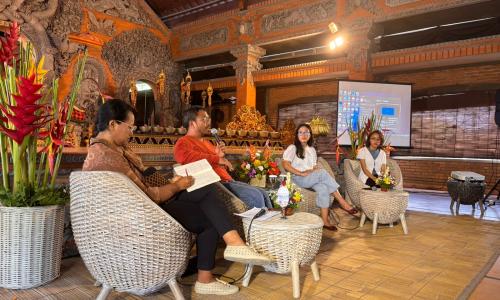
Bali's Traffic Gridlock: A Dialogue on Sustainable Mobility Solutions by Ubud Writers Readers Festival and Bali Clean Zero Emission Coalition
Ubud, Bali - February 24, 2024 - Despite Bali's enduring charm, traffic congestion remains a pressing issue. Addressing this concern, a public discussion was held by the Bali Clean Zero Emission Coalition (Koalisi Bali Emisi nol Bersih), in collaboration with the Ubud Writers and Readers Festival (UWRF) and local media outlet Balebengong.id, a grassroots journalism initiative enacted by the people of Bali.
This initiative aims to kick start public discourse on sustainable transportation solutions and shape future policies rooted in Balinese values, facilitate knowledge sharing among organizations who have local expertise in the space. Indonesia's commitment to zero emissions by 2060, or earlier by 2050, emphasizes the need for concrete actions aligning with climate change mitigation plans.
Launched in August 2023, the Bali Net Zero Emission Initiative 2045 reflects the province's dedication to achieving zero emissions by 2045, driven by Governor Regulation No. 45 of 2019. Following the declaration of the ambitious targets, World Resources Institute (WRI) Indonesia together with Institute for Essential Services Reform (IESR), New Energy Nexus, and Culture, Arts, Science, Technology (CAST) Foundation as well as local actors created Bali Net Zero Emission Coalition aims to catalyze initiatives towards zero emissions in Bali, addressing wide range of stakeholders including government, businesses and civil society organization.
The Coalition spearheads collaborative efforts, guided by Balinese values, towards this goal. Held at the Balai Banjar Ubud Kelod in Gianyar on Saturday (24/2/2024), the dialogue shed light on the multifaceted challenges posed by congestion, particularly in the iconic tourist hub of Ubud.
Drawing upon a wealth of expertise and firsthand experiences, the discussion highlighted the urgent need for concerted action to mitigate congestion's adverse impact on Bali's tourism landscape. Notable speakers, including esteemed academician I Nyoman Gede Maha Putra from Warmadewa University, discussed the complex interplay between tourism development and spatial planning in Bali. These insights highlighted how the surge in tourism has precipitated shifts in land use patterns, contributing to the traffic gridlock gripping the island.
"The distribution pattern must be arranged and regulated by the government," remarked Nyoman Gede, emphasizing the pivotal role of strategic spatial planning in managing Bali's burgeoning tourism sector. This sentiment was echoed by Sofwan Hakim from WRI Indonesia, also part of the Bali Net Zero Emission Coalition, advocated for holistic interventions to alleviate congestion, beginning with the enhancement of pedestrian infrastructure to promote non-motorized transportation, such as walking as a viable alternative to motorized travel. Additionally, it was conveyed that addressing traffic congestion in Bali, including in Ubud, can be initiated through the enhancement of pedestrian facilities, thereby facilitating and incentivizing pedestrian travel over vehicular commuting. Subsequently, efforts can be directed towards the enhancement of public transportation services and facilities to promote widespread adoption of public transit options.
Regarding the efforts to improve the situation, Marlistya Citraningrum from the IESR emphasized the importance of enhancing the quality of existing vehicles. She acknowledged that the government has implemented several initiatives to encourage the transition, such as increasing fuel prices. Citraningrum stressed that "Time is money," making such initiatives a crucial consideration. With the program held in Bali, she sees opportunities for the government to further promote programs that support the transition to more environmentally friendly vehicles.
Ni Putu Satya Sephiarini and Luh Muni Wiraswari, founders of Kaki & Roda, a community-driven platform dedicated to fostering a culture of shared economy and connectivity through a shared interest in public transportation in Bali, have highlighted the challenges posed by the lack of accessibility to public facilities for commuting. They emphasize that this not only impacts transportation but also impedes human connections and community-building efforts in today's society.
Further enriching the discourse, Made Arianta, Head of the Transportation Agency of Gianyar Regency, revealed collaborative initiatives aimed at ushering in a paradigm shift in public transportation. Through partnerships with entities like the Toyota Mobility Foundation (TMF), the government is spearheading transformative projects under the Sustainable Mobility Advancing Real Transformation (SMART) program. Additionally, plans are underway to establish strategically located parking facilities around Ubud, a proactive measure to curtail vehicular influx and alleviate congestion hotspots.
The discussion resonated with the imperative of community engagement, in fostering sustainable mobility solutions and enhancing the visitor experience in Bali. These efforts involve bridging local civil society organizations and communities with national-level stakeholders to tackle barriers hindering the achievement of net-zero emissions in Bali. For instance, the Coalition facilitates dialogue between grassroots organizations, residents, and governmental bodies to address transportation challenges and promote sustainable mobility solutions. This inclusive approach ensures that diverse voices are heard and that collective action is taken to realize the goal of a greener, more sustainable Bali.
In light of escalating traffic woes, the dialogue served as a clarion call for proactive measures and innovative strategies to safeguard Bali's status as a premier tourist destination while ensuring the well-being of its residents and visitors alike. This collaborative approach involves community engagement, stakeholder collaboration and government led interventions focused on improving transportation infrastructure and promoting sustainability mobility solutions. Central to this effort is the Bali Project Management Office, led by WRI as a secretariat of the Coalition, which coordinates stakeholder actions to advance clean energy and low-carbon development. This work aligns with WRI's mission by promoting sustainable practices and resilience, making it pivotal in achieving Bali's goals of reducing congestion and preserving its natural beauty.